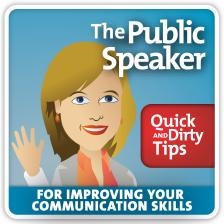Why You Mumble (and Why You Need to Stop!)
In Part 1 of this series, The Public Speaker explains why we learn to mumble at a young age, and why we need to articulate and enunciate our words in ordeer to succeed.
Lisa B. Marshall
Listen
Why You Mumble (and Why You Need to Stop!)

Mumbling.
Most of us do it without even knowing it. Sometimes we even do it on purpose. However, mumbling is a bad habit, particularly in a professional or educational environment. As James mentions, you can instantly lose credibility when you don’t speak clearly and plainly.
>
Today we’re going to talk about the reasons people mumble and in the second part of this mini-series I’ll talk about techniques you can employ to stop mumbling and be heard.
In my house, I often find myself saying to my daughters, “Can you please repeat that slowly and clearly so that I can understand you?” Although it bothers me that I have to keep reminding my children to enunciate, I can think of 5 good reasons why my girls sometimes mumble. I think you’ll be able to relate to these reasons too!
Why We Mumble
Reason #1: “I don’t really want you to hear me.”
When I ask my daughters, “What was fun about today?” I can tell how each feels by whether she mumbles an incoherent answer or looks me in the eye and speaks clearly.
I see this in the professional world too. A person who doesn’t have a good answer to an interview question might mumble their way through a half-baked example. Someone put on the spot during a meeting might mumble something about their team’s status. On the other hand, if that same person is prepared and confident, they’ll deliver their information clearly.
Reason #2: “We have our own language.”
My girls are twins and twins really do have their own language that no one else can understand. I don’t just mean made-up words and strange rhythms. Twins sometimes don’t need to articulate because they can understand each other no matter how the words are spoken.
If you find people asking you to repeat yourself frequently, you might be a mumbler.
A colleague of mine can relate. She and her 3 siblings speak very quickly and softly to each other. They don’t notice it, but when outsiders come around, they often comment on it. As an adult, she works hard to speak clearly and slow down, but when she’s with her family, she falls right back into those patterns. It’s fine to have your own form of communication with someone close to you, but leave the mumbling at home when you walk out the door.
Reason #3: “I’m focused on something else.”
Have you ever asked your kid a question while they’re playing a game or reading a book? They don’t stop playing or reading, do they? They might not even answer you the first time. But when you ask again, they’ll mumble an answer without looking up.
I have to say, “Please close your book and look at me” or something like that before I can get an articulate answer. Adults do the same thing – talking and texting at the same time, carrying on a conversation while keeping an eye on the football game. It’s simple – if you aren’t focused on what you’re saying, you won’t say it clearly.
Reason #4: “I’m nervous.”
My girls recently attended drama camp. At the end of the 6 weeks they put on a play for the parents. During rehearsals most of the kids (with prompting) spoke clearly and loudly. But during the first performance in front of an audience, some of the kids forgot what they’d learned and began mumbling – speaking quietly and quickly. I explained to my girls that if the audience doesn’t understand your words because you’re mumbling, they’ll get confused about the story.
Nervous mumbling isn’t just a childhood affliction. I’ve heard new lawyers mumble in the courtroom. I’ve watched PTA leaders mumble their way through requests for volunteers. And unfortunately, I’ve heard doctors mumble difficult test results to patients.
Reason #5: “What do you mean I mumble? I don’t mumble!”
Have you ever told someone they snore? Most snorers flatly deny it. “I was just breathing loudly,” “You’re the one who snores, not me.” The only way to convince someone they snore is to record them in their sleep and play it back to them.
Many of us don’t realize we mumble. Most kids will not admit they mumble. When I tell my kids they’re mumbling, their usual response is, “No, you need to get your hearing checked” or “Of course, you think I’m mumbling, Mrs. Public Speaker.”
If you find people asking you to repeat yourself frequently, you might be a mumbler. It’s frustrating to hear “What?” all the time. You can fix this problem by speaking clearly and at the right volume.
Hurry! Lisa is giving away 9 of her most popular “Top Ten Tips” series “cheat sheets”! Click to Download!
Mumbling Is a Credibility Killer
Mumbling is a bigger problem than you might think. In 2008, several “top dogs” in British theater called for what was dubbed “a national centre of articulacy” to address the growing problem of inarticulate mumbling. It sounds made up, but it is a very real problem! Dr. Andrew Tucker, a professor at University College London and Birkbeck College was quoted saying:
“…Thousands of jobs a year are not being filled easily because applicants can’t communicate effectively. Large companies complain of having to spend thousands of pounds on training call centre staff in basic communication, and in a survey two months ago 91% of primary school teachers said speaking and listening skills – the twin pillars of oracy – should be the priority for schools…”
If you think your mumbling isn’t a big deal, or isn’t holding you back, think again.
If you’re a mumbler, you’re probably not taken seriously at work. People may have even stopped listening to you. When skills are even, and sometimes even when they aren’t, the clear, articulate communicator will likely beat you out for every promotion and opportunity.

This is Lisa B. Marshall, The Public Speaker. Helping you lead, influence, and inspire through better communication. Your success is my business.
Are you a Smart Talker? Take the Smart Talk Quiz to find out! If you enjoyed, subscribe, rate, and review on iTunes!
Blah image courtesy of Shutterstock

